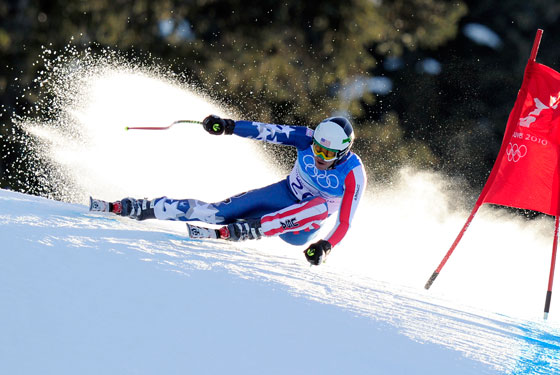
In 2006, American skier Bode Miller fizzled at the Winter Olympics in Turin, Italy. It wasn’t just that he failed to deliver on his hype, but more ignominious he didn’t hustle. Not hustling is un-American, as everyone from a glove-sucking T-baller to an elite athlete knows. To not hustle is to not try. Miller brought his hustle back to these games on Sunday by avoiding the pre-Games hype, curbing his free-for-all tendencies on the downhill, and skiing a precise, disciplined slalom run. Miller did not ski the fastest time in either event, but his combined time bested a field of 33 other skiers. He earned not only an elusive gold medal in the Men’s Super Combined, but also regained the love and admiration of the American public.
After failing to hustle in the Nagano Olympic trials, Apolo Ohno’s father left his 15-year-old son in a “remote cabin along the Washington shore” for eight days while the speed skater considered whether to continue with the sport. Only in the Olympics would this story be described as an object lesson in character-building (by an admiring Chris Collinsworth, no less) instead of a plot device on Law & Order: SVU. But hey, it worked! Ohno is now the most-decorated U.S. Winter Olympian. He won his seventh medal, a bronze, during the men’s 1,000-meter short-track race on Saturday. Sandwiched between two Canadian brothers in front and a pair of South Koreans in the back, Ohno was pushed back to fifth by the Koreans, but was able to pass the Canadians on the outside. Summer Olympian Michael Phelps watched Ohno’s achievement, but he looked out of place, perhaps because he was wearing so many clothes.
Shani Davis holds the world record in men’s 1,500-meter speed skating, but he could not win the event in Vancouver. He lost to Dutchman Mark Tuitert by less than a second, tiring in the final stretch. “That’s my favorite race and I want to win it one day,” Davis told NBC, but declined to commit to returning for the 2014 games in Russia.
Bobsled (or bobsleigh, if you want to be Olympic about it) took over the sliding center last weekend, and the track is not any more forgiving for these athletes than it was to skeleton and luge competitors. (Steve Holcomb, a member of the U.S. team, dubbed one part of the track the “50/50 Curve” after half the sleds crashed during training runs one day last year.) Bobsledders are the giants of the Olympic Games. Many of the brakemen are over 200 pounds, and several are former football players. The elaborate starting rituals the chants, the butt slaps, the fist pounds resemble American end zones like no other Olympic event. Plus, there’s crashes!
There’s also crashes in Ski Cross, a new event at the Games in which four skiers race down a trail with more jumps than a custom-designed ExciteBike course. The skiers try to pass each other on the turns, which is also where the crashes occur. Canada’s star is Chris Del Bosco, who is actually an American who was kicked off the U.S. Junior Ski Team after testing positive for drugs. He was also an alcoholic, and nearly died of a broken neck when he fell into a creek bed in Colorado during a drunken walk home. Since his father is Canadian, Del Bosco, now sober, was eligible for the team. He made it to the finals, passed his way out of fourth place and into bronze position, only to wipe out coming off a jump. “You can see him trying to roll down the window there,” the NBC analyst said of Del Bosco’s attempt to right himself into the air. The Olympics has such great lingo.
What to Watch Tonight
Ski Jumping
Cross-Country Skiing
Ice Dancing?